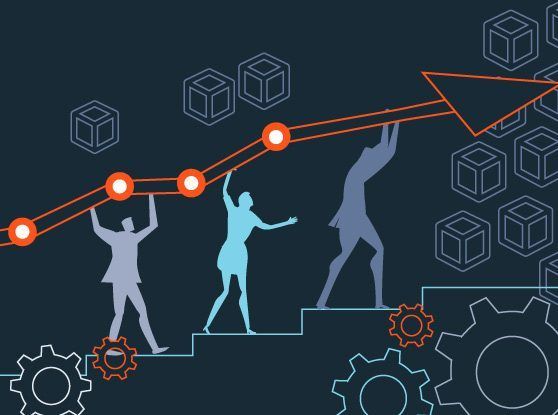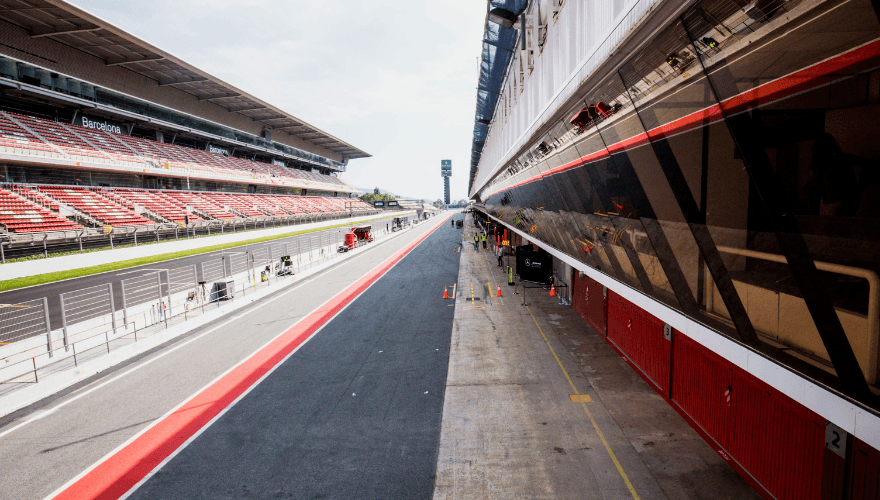
Insight IGNITE Innovation Roundtable series provides C-level technology and digital leaders from large global companies with the opportunity to learn, network with peers, and engage with emerging market leaders.
At June’s Insight IGNITE roundtable, a two-day event held at Meadowood Napa Valley, thirty business and IT leaders from large global companies met to discuss digital business transformation and some of the underlying technology drivers powering the change: data/AI/ML, Continuous Testing, Hybrid Cloud, Cyber-Security and Digital Adoption. In addition to the speakers and breakout sessions, guests shared their unique insights with one another, and forged business relationships – while touring two beautiful wineries in the Napa Valley. Below are select highlights from the event.
Keynote on “The Future of Digital: Opening Up the Platform” by Paul Walsh, Senior Vice President, Visa Platform Strategy & Innovation at Visa
- Paul is leading the charge at Visa to open the platform and provide business partners with the ability to innovate in collaboration with Visa.
- Paul's advice: No matter your industry, if you’re committed to Digital transformation, start with the customer and work your way backwards into Digital solutions.
- Even incremental innovation can drive huge efficiencies. Companies don’t always need radical change to achieve positive impact.
- Data is at the centre of everything. To drive innovation, incubators and innovation centres should be launched after the data and platforms are available.
Keynote on Creating an Infinitely Scalable and Affordable Data Lake for the Machine by Walter Scott, CEO at Devo
Walter Scott discussed the value of data. Today it is challenging for large global corporations to effectively leverage powerful technologies such as artificial intelligence and machine learning primarily because the data is highly decentralised and largely unavailable to end users and business decision-makers. Traditional platforms like Splunk face fundamental technical constraints given the sheer volume of data generated by the machine; pricing models provide additional friction to adoption.
Scott’s takeaways:
- 80% of all data is unstructured and will continue to grow exponentially with email, collaboration platforms, machine-generated data, and social media, among other sources
- Global companies need to be able to access the huge volume of real-time data to compete in today’s markets.
- While billions of events could be handled by traditional relational databases, trillions of events will require next-generation platforms. Platforms like Devo help make this feasible.
- Telefónica, as one example, is leveraging Devo as its data engineering platform for all machine data produced by mobile phones, cell towers, routers, IPTVs and traditional log data across the enterprise; the company has unlocked numerous new business opportunities as a result.

Showcase on “Removing Legacy Testing as Road Block to Agility” with executives from Tricentis, QASymphony and WalkMe.
While many organisations have made great progress on the adoption of Agile for development, traditional testing and training create massive roadblocks to agility. To remedy this, Tricentis and QASymphony can automate traditional functional, load, performance testing and test management, while Walkme can eliminate training altogether. In both cases, executive sponsorship is required given that these platforms disrupt the people, process and technology surrounding current testing and training teams and workflows.
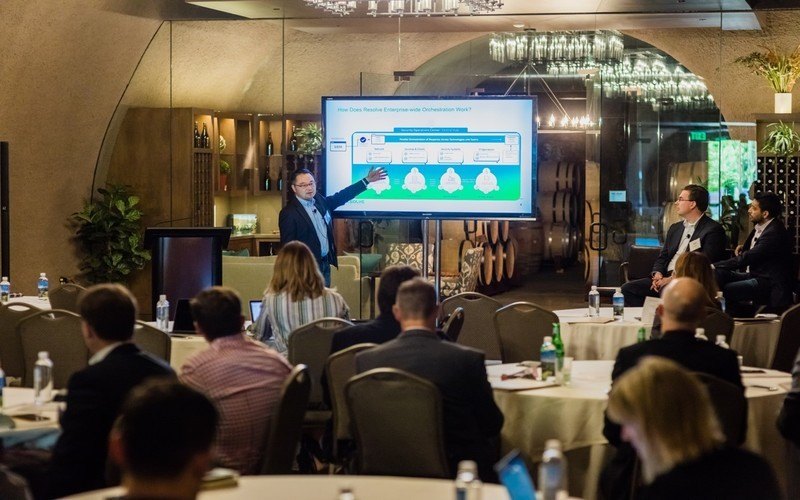
Showcase on “Defending the Enterprise with AI” by Nicole Eagan, CEO at Darktrace with John Giacomini, EVP at Cylance, Kurt Lieber, CISO at Aetna and Friedrich Wetschnig, CISO at Flex
Nicole Eagan, CEO at Darktrace, led a discussion about the application of AI in the world of cyber security and was joined by executives from Cylance, Aetna and Flex. At the highest level, organisations are looking to leverage AI as a result of the skills gap in cyber security; to whit, there are already millions of open cyber security jobs and the numbers are continuing to grow, especially as bad actors target enterprises Darktrace uses AI to continuously predict where nefarious attacks will, and do, occur inside the enterprise. Cylance blocks them from entering at the end point. Both CISOs on the panel confirmed that they see the role of AI in cyber growing as attackers get more sophisticated and creative and increase the speed with which they target vulnerabilities. Without AI, enterprises will not be able to keep up with the pace of change – next-gen businesses that improve and learn constantly, like Darktrace and Cylance, are therefore more viable than traditional legacy software companies.
Keynote and fireside chat on “The Canary in a Coal Mine: A Digital Apocalypse in the Music Industry” by Jon Cohen, former EVP, Recorded Music, BMG Rights Management at Bertelsmann with Ted MIco, former EVP, Strategy and Operations at Interscope Geffen A&M
Executives can learn as much from failures as successes. Jon Cohen led a fascinating discussion about how Digital disruption resulted in the “apocalypse” of the music industry. Prior to the disruption triggered by Napster and others, the music industry was a $20 billion global market. In a few short years, this cratered to $4 billion. Ted shared how his experience during this disruption was similar to parachuting out of an airplane. While on the plane and getting instructions, everything seems to make sense, but once he jumped, he was on his own and reacting real-time. The Goldman Sachs report, Music in the Air: Streaming Drives Industry Comeback, predicts the music industry will ultimately recover and even grow back to $30 billion given the new business models created by Apple, Pandora, Spotify, Amazon and others, but the path to a full recovery is still not clear.
Jon Cohen’s lesson is that disruption can happen faster than incumbents can imagine, and industry executives are often unable to make clear-headed decisions about what to do during the time of crisis. When asked which industry might be next, Blockchain’s impact on the financial services industry was the first thing that came to mind.
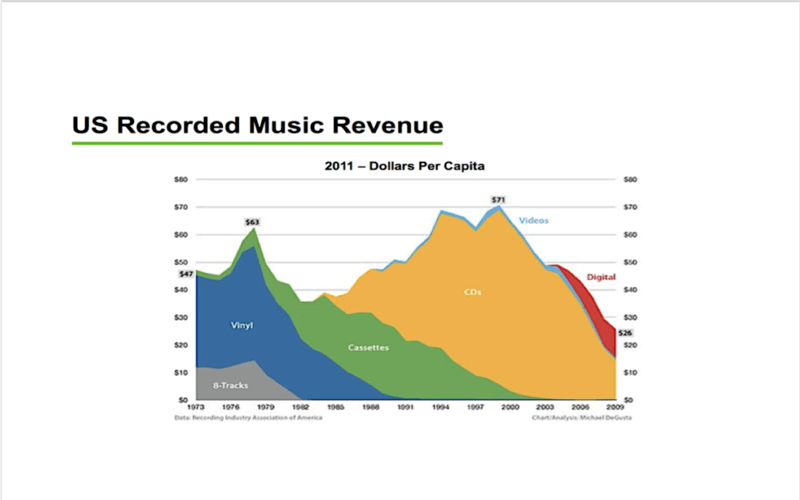
Keynote and panel discussion on “How Fast Can You Move? – The Power of Unconstrained Software Delivery” by Thomas Blood, Enterprise Strategist, Amazon AWS at Amazon
- Panel: Jane Li, former COO, Huawei Enterprise US at Huawei; Board Director at Knowles
- Panel: Jim Sappington, former EVP, Operations, Digital, and Technology at McDonald’s
- Panel: Marcelo De Santis, former CIO/CDO at Pirelli
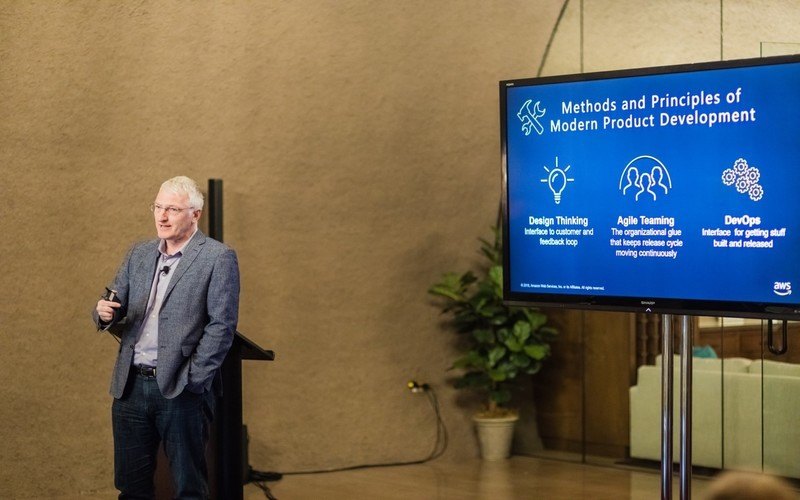
Thomas Blood, Enterprise Strategist at Amazon AWS led a discussion about how leveraging the Cloud can dramatically accelerate the delivery of Digital apps. Thomas confirmed that large global companies must continue to transform from “project delivery” to “product delivery” in order to compete and thrive in this new Digital world. The most powerful technique is to work from the customer backwards and then ideate, test, test and test – as suggested by Paul Walsh from Visa.
At AWS, Jeff facetiously says his philosophy is to write the press release and FAQ first and then work backwards from there. It’s critical for business and technology leaders to “make time for demos” during the agile sprint process as it shows commitment and also allows for the appropriate level of collaboration with customers.
DevOps is the “secret sauce,” said Thomas, and it’s critical to automate everything all the time. Thomas also shared that large global companies need to adopt an architectural philosophy that dictates “no system or platform can be purchased that doesn’t have an API.” Other points to note include:
- Cloud is a topic at the board level. It is viewed as strategic and critical to agility and therefore is a board level issue. (Jane Li)
- Driving adoption of Cloud in the mobile development environment first is a great strategy to launch a transformation. At McDonald’s once the organisation saw how fast they could move, the rest of the project teams quickly began to jump on board. (Jim Sappington)
- The “people” side of the business was a challenge for Pirelli who partnered with ThoughtWorks and several universities to address the skills gap and were ultimately were able to get the transformation off the ground. (Marcelo de Santas)
Book recommendations on the topic include:
Insight IGNITE Innovation Showcase on “What’s Next in the Hybrid Cloud” by Boris Renski, CMO and Co-Founder at Mirantis
Boris Renski, Co-Founder of Mirantis believes that we shouldn’t limit thinking to “Hybrid Cloud” but broadly consider “Hybrid Applications”. Large global companies continue to struggle with the concept that application and infrastructure teams are separate and have unique points of view. He suggests that companies need to think in terms of a development pipeline versus stack and that this frame of mind can bring the development and infrastructure teams onto the same page. “Every vendor who can’t compete in cloud chooses hybrid cloud as their strategy.” Thinking in terms of hybrid applications, decouples CI and CD.
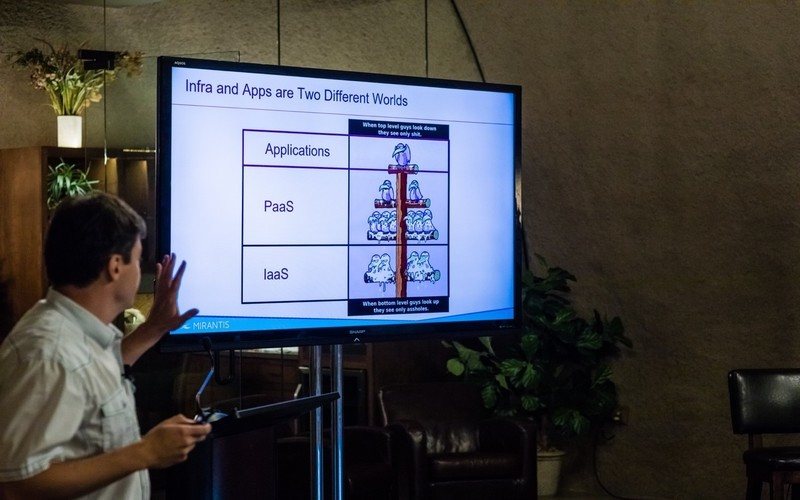
Keynote on “Disrupt or Be Disrupted: A View From the Other Side” by Gary Hoberman, former EVP, Co-CIO at MetLife and Founder & CEO at Unqork
Gary Hoberman has spent more than 20 years as a senior IT leader in the financial services industry at Citi and insurance industry at Met Life. With the emergence of Digital disruption, Hoberman began to focus on understanding what will be at the core of Digital disruption for traditional industries. According to Hoberman, Chief Information Officers must transform quickly into Chief Product Officers and business and technology leaders must come together to innovate. Large global companies have to understand “what is our core differentiation” and focus on driving innovation at this base level. Anything that’s not tied to this core differentiation should be outsourced so the organisation can focus on innovation as the core.
Gary’s point is that in the future, insurance companies will be data-science companies. It is not about the process, but the analytics that you can gain from the process. Gary recently left the corporate world to be the Founder and CEO of a start-up called Unqork. He has a vision to provide a platform that will allow banks and insurance companies to focus more effectively on their core competitive differentiation. He concluded his session with the question; “what is your core competitive advantage?”
In Summary
Digital disruption will happen faster and with more volatility than companies can imagine, the music industry being a good case in point. Given the pressure to maintain and grow revenue, profitability and protect the existing business, it remains extremely challenging for large global companies to formulate their strategy to reengineer while the airplane is in flight. Putting the customer in the centre and re-engineering mindsets is easier said than done. By hosting Insight IGNITE Innovation Roundtables, we plan to bring executives together to discuss best practices and develop insights about the processes, foundations and technologies that will help global companies cross the Digital chasm.





